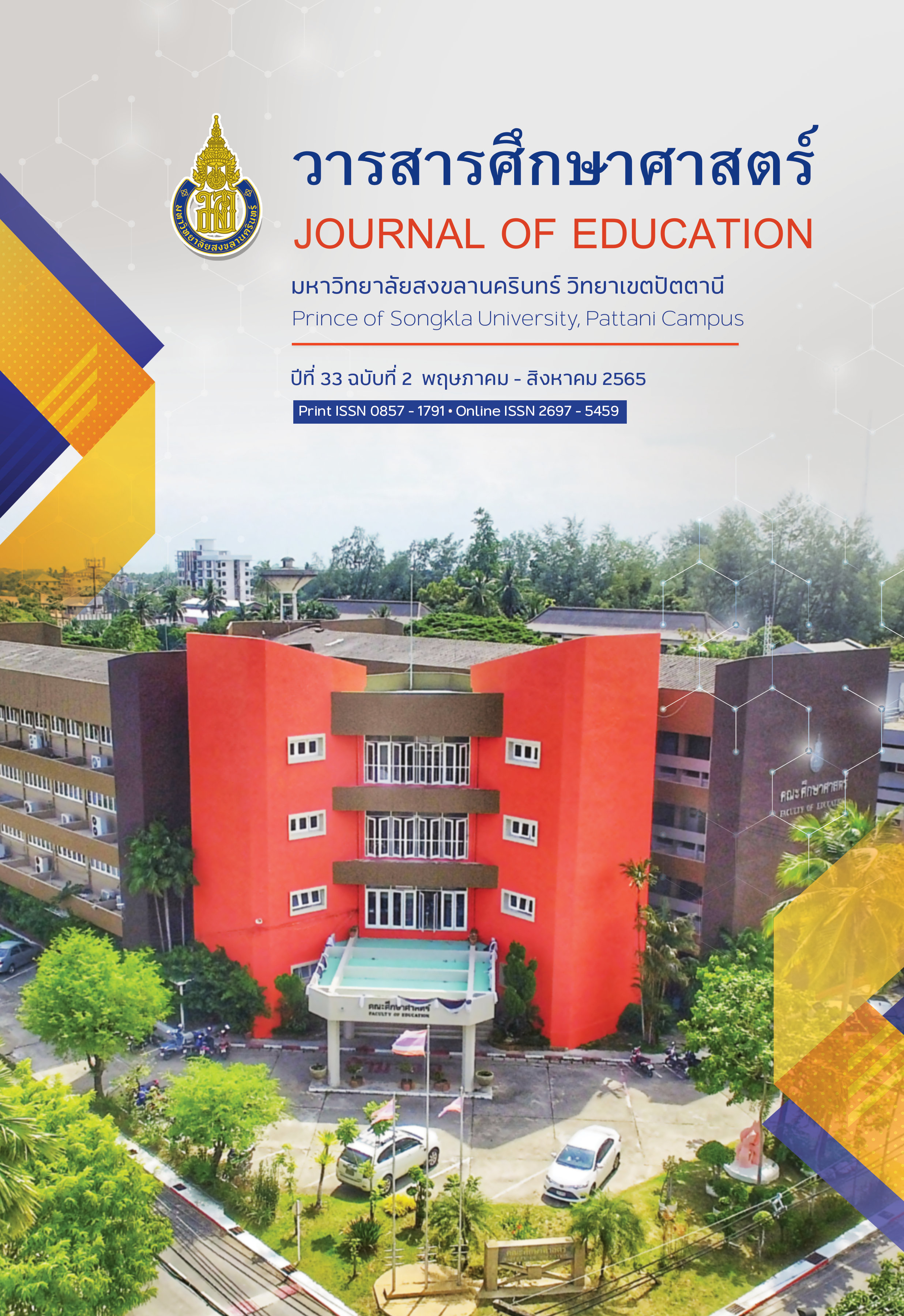การจัดการเรียนรู้ทางไกลรูปแบบ POSN E-camp สำหรับผู้มีความสามารถทางฟิสิกส์ ในช่วงที่มีการระบาดของไวรัสโคโรนา 2019
Main Article Content
บทคัดย่อ
ในอดีตกิจกรรมอบรมฟิสิกส์โอลิมปิก ค่าย 2 มีการจัดอบรมตามแนวทางที่ทำต่อ ๆ กันมาทั้งในห้องเรียนและในห้องปฏิบัติการที่นักเรียนและผู้สอนได้พบกันและสื่อสารกันโดยตรง จนกระทั่งปี พ.ศ. 2563 ที่มีการระบาดของไวรัสโคโรนา 2019 เป็นวงกว้างทั่วโลก ทำให้การอบรมฟิสิกส์โอลิมปิก ค่าย 2 ศูนย์มหาวิทยาลัยวลัยลักษณ์ ไม่สามารถดำเนินด้วยรูปแบบดั้งเดิมได้ เพื่อป้องกันการติดต่อของโรคจึงต้องเปลี่ยนการอบรมเป็นรูปแบบทางไกล เพื่อที่จะคงธรรมชาติของการอบรมฟิสิกส์โอลิมปิกที่มีความเข้มข้นทางวิชาการ ผู้จัดจึงได้พัฒนารูปแบบการอบรมทางไกล POSN E-camp โดยมีวัตถุประสงค์เพื่อศึกษาความพึงพอใจและผลสัมฤทธิ์ทางการเรียนของนักเรียน รูปแบบที่พัฒนาขึ้นนี้ประกอบด้วย 5 ขั้นตอน ได้แก่ การวางแผน การกำหนดกิจกรรมตามหลักสูตรโอลิมปิกวิชาการ การจำลองกิจกรรม การอบรมตามหลักสูตร และการประเมินผล เครื่องมือในการเก็บรวบรวมข้อมูลประกอบด้วยแบบประเมินผลความพึงพอใจและแบบทดสอบผลสัมฤทธิ์ทางการเรียนของนักเรียน จากการศึกษาพบว่า ในภาพรวมคิดเป็นร้อยละ 52.9 ของจำนวนผู้ตอบแบบสอบถามทั้งหมด มีความพึงพอใจต่อการจัดการเรียนการสอนแบบ POSN E-camp ในระดับมาก และมีคะแนนเฉลี่ยผลสัมฤทธิ์ทางการเรียนสูงกว่าการอบรมแบบปกติเมื่อเทียบกับปีที่ผ่านมา
Article Details

อนุญาตภายใต้เงื่อนไข Creative Commons Attribution-NonCommercial 4.0 International License.
เอกสารอ้างอิง
Akyol, Z., Garrison, D. R. & Ozden, M. Y. (2009) Online and Blended Communities of Inquiry: Exploring the Developmental and Perceptional Differences, International Review of Research in Open and Distance Learning. 10(6), 65-83.
Alsaadat, K. (2019). Strategic Human Resource Management Technology Effect and Implication for Distance Training and Learning, International Journal of Electrical and Computer Engineering, 9(1), 314-322.
Anderson, T. (2004). Theory and Practice of Online Learning. Retrieved from
Gorsky, P. & Trumper, R. (2004). Dialogue in a distance education physics course. Open Learning, 19(3), 265-277.
Kammanee, T., (2011). Science of teaching, knowledge for efficient learning management. Bangkok: Chulalonkorn University. [in Thai]
Litkityinwara, S., & Sungsri, S. (2013). Development of distance learning model for Faculty of Education, Rajabhat University. Silpakorn Educational Research Journal, 5(2), 309-321. [in Thai]
Mavroudi, A., & Hadzilacos, T. (2013). Learning Needs Analysis of Collaborative E-Classes in Semi-Formal Settings: The REVIT Example. International Review of Research in Open and Distance Learning, 14(5), 211-239.
Moore, M. G. (1993). Theory of Transactional Distance. In D.Keegan (Ed). Theoretical principles of distance education. London, New York: Routledge, (pp.22-38).
The Association for Educational Communications and Technology. (2001). The handbook of research for educational communications and technology. Retrieved from http://members.aect.org/edtech/ed1/13/13-02.html
Vanakieat, K., (1997). Effectiveness of distance learning via Thai Com satellite: a case study of informal school at Sankampaeng district, Chiangmai province. [Master degree thesis of communication arts]. Bangkok: Chulalongkorn University. [in Thai]
Visavateeranon, S., & Chindanurak, T. (2018). Education of Sukhothai Thammathirat Open University 40 year with success in distance learning. STOU Education Journal, 11(2), 1-18. [in Thai]


